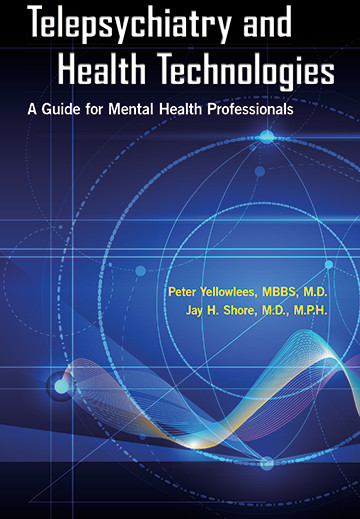There remains a shortage of psychiatrists and other mental health professionals in many service areas of the United States and around the world. Telepsychiatry and other health technologies have provided a means of addressing some of these shortages. The use of these technologies is expected to increase over the next decade, allowing for greater mental health care of more diverse populations.
Peter Yellowlees and Jay Shore have edited Telepsychiatry and Health Technologies: A Guide for Mental Health Professionals. This book has been written to be both a core resource for the training of mental health professionals and a reference for those already trained in the use of health technologies. The editors have an aim that this book will eventually be a clinical textbook for the field. The editors note in the preface that the “book focuses on the doctor-patient relationship, and is a practical description of how psychiatrists and other mental health professionals may leverage expanding digital technologies and processes currently available, and that are increasingly being used in clinical practice, for the assessment and treatment of patients with psychiatric disorders.” The book provides practical guidance and advice on the optimal use of telepsychiatry and other health technologies.
The book has 10 chapters, with each providing major learning objectives or findings and a brief summary. One major advantage of this book is that each chapter has section headings posed as questions; each section provides a detailed answer to the question, with references. The editors have organized the chapters and section headings to provide a comprehensive review that is well written by very knowledgeable authorities in the field.
The book has three major sections, with the first section having four chapters related to current status, the evidence base for telepsychiatry, business development related to health technologies, and models of care. The second section has four chapters related to the core elements of a clinical practice using these technologies. The major areas covered in the second section include communication and media skills, data collection from nonpatient interview sources, clinical documentation, and indirect consultations and hybrid care. The final section of the book has two chapters devoted to patient population management and competencies, skills, and quality of care. Throughout the book, the editors have used numerous clinical case studies that illustrate major themes of the sections; these are illustrative of actual clinical situations using health technologies and will be a valuable resource for practicing clinicians.
While all chapters in the book are relevant to the discussion of advancing health technologies, there are several major themes that transcend various chapters. First is that current psychiatric practice tends to be inefficient and that there is a need to leverage technology as part of change management; in the future, the traditional in-person patient session may not be considered the optimal practice standard. Second is that advancing health technologies need to consider emerging technologies beyond simple audiovisual conferencing to include, for example, social networking, virtual reality treatments, and artificial intelligence. Finally, the psychiatrist-patient relationship will center more on the elements of treatment planning, with technology providing the opportunity for hybrid care models in the future.
The editors have provided in one source a comprehensive text covering all major areas of telepsychiatry, including emerging technologies. Although the field of telepsychiatry is rapidly changing, the editors have provided clinicians with a resource book that will answer nearly all questions related to the practice of clinical telepsychiatry. As such, this book is highly recommended, especially for those considering expanding clinical practice beyond the traditional in-person session. The book is ideally suited for mental health trainees and practicing clinicians in all mental health fields.


